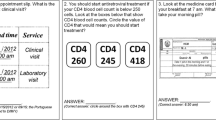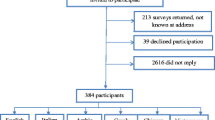Abstract
Health literacy is related to a number of health status variables and has been associated with medication adherence in persons treated for HIV infection. Currently-available measures of health literacy require lengthy administration or have content or format limitations. In this paper we report the preliminary development and validation of a brief computer-administered health literacy test that includes content focused on medication adherence as well as questions based on a video simulation of an HIV-related clinical encounter. The measure shows significant relations with other measures of health literacy, HIV-related knowledge, and electronically-measured medication adherence. We also present receiver operating characteristic analyses that provide estimates of various scores’ sensitivities and specificities so that the HIV-Related Health Literacy Scale can be used as a screening measure.
Resumen
El alfabetismo en salud está relacionado con un sinnúmero de variables y ha sido asociado con la adherencia a los medicamentos en personas que reciben tratamiento para la infección por el VIH. Las medidas de alfabetismo en salud que están actualmente disponibles toman mucho tiempo en administrarse y evidencian limitaciones de contenido o formato. En este artículo, reportamos el desarrollo preliminar y la validación de una prueba computarizada breve de alfabetismo en salud cuyo contenido se centra en la adherencia a los medicamentos, así como en preguntas basadas en un video que presenta una simulación de una visita médica relacionada con el VIH. Esta medida demuestra relaciones significativas con otras medidas de alfabetismo en salud, el conocimiento relacionado al VIH y la adherencia a los medicamentos medida electrónicamente. También presentamos análisis de la curva ROC que proveen estimados de la sensibilidad y especificidad de varias puntuaciones, de modo que la medida VIH-AS pueda ser utilizada como un cribado.
Similar content being viewed by others
References
Nielsen-Bohlman L, Panzer AM, Kindig DA. Health literacy: a prescription to end confusion. Washington, DC: National Academies Press; 2004.
Dewalt DA, Berkman ND, Sheridan S, Lohr KN, Pignone MP. Literacy and health outcomes: a systematic review of the literature. J Gen Intern Med. 2004;19(12):1228–39.
Berkman ND, Sheridan SL, Donahue KE, Halpern DJ, Crotty K. Low health literacy and health outcomes: an updated systematic review. Ann Intern Med. 2011;155(2):97–107.
Sudore RL, Yaffe K, Satterfield S, Harris TB, Mehta KM, Simonsick EM, et al. Limited literacy and mortality in the elderly: the health, aging, and body composition study. J Gen Intern Med. 2006;21(8):806–12.
Kutner M, Greenberg E, Jin Y, Paulsen C. The health literacy of America’s adults: results from the 2003 National Assessment of Adult Literacy (NCES 2006-483). Washington, DC: US Department of Education, National Center for Educational Statistics; 2006.
Ownby RL, Waldrop-Valverde D, Taha J. Why is health literacy related to health? An exploration among US National Assessment of Adult Literacy participants 40 years of age and older. Educ Gerontol. 2012;38(11):776–87.
Osborn CY, Paasche-Orlow MK, Davis TC, Wolf MS. Health literacy: an overlooked factor in understanding HIV health disparities. Am J Prev Med. 2007;33(5):374–8.
Paasche-Orlow MK, Wolf MS. Promoting health literacy research to reduce health disparities. J Health Commun. 2010;15(Suppl 2):34–41.
Waldrop-Valverde D, Osborn CY, Rodriguez A, Rothman RL, Kumar M, Jones DL. Numeracy skills explain racial differences in HIV medication management. AIDS Behav. 2010;14(4):799–806.
Kalichman SC, Rompa D. Functional health literacy is associated with health status and health-related knowledge in people living with HIV-AIDS. J Acquir Immune Defic Syndr. 2000;25(4):337–44.
Parker RM, Baker DW, Williams MV, Nurss JR. The Test of Functional Health Literacy in Adults: a new instrument for measuring patients’ literacy skills. J Gen Intern Med. 1995;10(10):537–41.
Kalichman SC, Benotsch E, Suarez T, Catz S, Miller J, Rompa D. Health literacy and health-related knowledge among persons living with HIV/AIDS. Am J Prev Med. 2000;18(4):325–31.
Osborn CY, Davis TC, Bailey SC, Wolf MS. Health literacy in the context of HIV treatment: introducing the Brief Estimate of Health Knowledge and Action (BEHKA)-HIV version. AIDS Behav. 2010;14(1):181–8.
Kalichman SC, Ramachandran B, Catz S. Adherence to combination antiretroviral therapies in HIV patients of low health literacy. J Gen Intern Med. 1999;14(5):267–73.
Kalichman SC, Pope H, White D, Cherry C, Amaral CM, Swetzes C, et al. Association between health literacy and HIV treatment adherence: further evidence from objectively measured medication adherence. J Int Assoc Physicians AIDS Care (Chic). 2008;7(6):317–23.
Navarra A-M. Health literacy and adherence to antiretroviral treatment among human immunodeficiency virus (HIV) infected youth. New York: Columbia University; 2011.
Murphy PW, Davis TC, Long SW, Jackson RH, Decker BC. Rapid Estimate of Adult Literacy in Medicine (REALM): a quick reading test for patients. J Read. 1993;37:124–30.
Weiss BD, Mays MZ, Martz W, Castro KM, Dewalt DA, Pignone MP, et al. Quick assessment of literacy in primary care: the newest vital sign. Ann Fam Med. 2005;3(6):514–22.
Baker DW, Williams MV, Parker RM, Gazmararian JA, Nurss J. Development of a brief test to measure functional health literacy. Patient Educ Couns. 1999;38(1):33–42.
Baker DW. The meaning and the measure of health literacy. J Gen Intern Med. 2006;21(8):878–83.
Davis TC, Wolf MS, Bass PF III, Middlebrooks M, Kennen E, Baker DW, et al. Low literacy impairs comprehension of prescription drug warning labels. J Gen Intern Med. 2006;21(8):847–51.
Lezak M. Neuropsychological assessment. 5th ed. New York: Oxford; 2004.
Culbertson W, Zillmer EA. TOL-DX: Tower of London—Drexel University. 2nd ed. Toronto: Multi-Health Systems; 2005.
Lafayette Instrument Company. User instructions. Lafayette: Lafayette Instrument Company; 2006.
Wechsler D. Manual for the Wechsler Memory Scale. 4th ed. San Antonio: Psychological Corporation/Pearson Assessment; 2008.
Wechsler D. Manual for the Wechsler Adult Intelligence Scale. 4th ed. San Antonio: Psychological Corporation/Pearson Assessment; 2008.
The LifeWindows Project Team. The LifeWindows information motivation behavioral skills ART adherence questionnaire (LW-IMB-AAQ). Storrs: Center for Health, Intervention, and Prevention. University of Connecticut; 2006.
Radloff LS. The CES-D Scale: a self-report depression scale for research in the general population. Appl Psychol Meas. 1977;1:385–401.
Ownby RL, Hertzog C, Czaja SJ. Tailored information and automated reminding to improve medication adherence in Spanish- and English-speaking elders treated for memory impairment. Clin Gerontol. 2012;35:221–238.
Chesney MA, Ickovics JR, Chambers DB, Gifford AL, Neidig J, Zwickl B, et al. Self-reported adherence to antiretroviral medications among participants in HIV clinical trials: the AACTG adherence instruments. Patient Care Committee and Adherence Working Group of the Outcomes Committee of the Adult AIDS Clinical Trials Group (AACTG). AIDS Care. 2000;12(3):255–66.
DeVellis RF. Scale development, theory and applications. 2nd ed. Thousand Oaks: Sage; 2003.
Netemeyer RG, Bearden WO, Sharma S. Scaling procedures, issues and applications. Thousand Oaks: Sage; 2003.
DeVellis RF. Scale development: theory and applications. 2nd ed. Thousand Oaks: Sage; 2003.
Acknowledgments
Support for this study was provided by Grant R21MH086491 to Dr. Ownby from the National Institute on Mental Health.
Author information
Authors and Affiliations
Corresponding author
Additional information
Obtaining the HIV-HL: Information about how to obtain and use the HIV-HL is available from Dr. Ownby (ro71@nova.edu).
Rights and permissions
About this article
Cite this article
Ownby, R.L., Waldrop-Valverde, D., Hardigan, P. et al. Development and Validation of a Brief Computer-Administered HIV-Related Health Literacy Scale (HIV-HL). AIDS Behav 17, 710–718 (2013). https://doi.org/10.1007/s10461-012-0301-3
Published:
Issue Date:
DOI: https://doi.org/10.1007/s10461-012-0301-3




